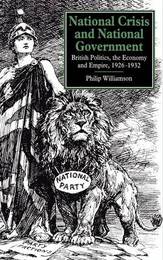
|
National Crisis and National Government: British Politics, the Economy and Empire, 1926-1932
Hardback
Main Details
| Title |
National Crisis and National Government: British Politics, the Economy and Empire, 1926-1932
|
| Authors and Contributors |
By (author) Philip Williamson
|
| Physical Properties |
| Format:Hardback | | Pages:588 | | Dimensions(mm): Height 229,Width 152 |
|
| Category/Genre | British and Irish History
World history - from c 1900 to now |
|---|
| ISBN/Barcode |
9780521361378
|
| Classifications | Dewey:941.082 |
|---|
| Audience | | Professional & Vocational | |
|---|
|
Publishing Details |
| Publisher |
Cambridge University Press
|
| Imprint |
Cambridge University Press
|
| Publication Date |
16 January 1992 |
| Publication Country |
United Kingdom
|
Description
From 1926 Britain fell into a condition of deep national crisis, which seemed to threaten its domestic stability and international power. By 1932 the effort to contain these problems had transformed British politics and policy. Strains produced by three-party politics, economic recession and imperial difficulties resulted during 1931 in such a severe financial and political crisis that the Labour government collapsed and Conservative, Liberal and some Labour leaders joined together in a National government. Despite large public expenditure cuts and tax increases, and despite devaluation of sterling and a new crisis in the Indian Empire, this government obtained the greatest British election victory of modern times. This book is the first to examine all aspects of the crisis together and in depth, using an extensive range of official, institutional and personal papers.
Reviews'It is a comprehensive study which will no doubt establish Williamson's reputation as a major authority on the high politics of this tense and dramatic period ... The book is a mine of information. New material has been unearthed, often from obscure archives. From such research comes a real understanding of the actors in the drama ... a valuable and highly rewarding contribution to the analysis of a highly significant historical event.' The Durham University Journal
|